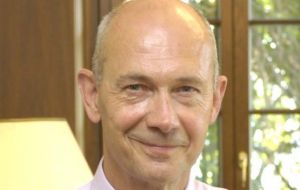MercoPress. South Atlantic News Agency
Last minute efforts to break global trade deadlock
 WTO Director General Paul Lamy
WTO Director General Paul Lamy The ministerial meeting in Geneva in the framework of the World Trade Organization (WTO) long-running Doha round talks has failed to break the deadlock and several issues remain intractable, from farm subsidies to car import duties.
In a desperate attempt to save the talks WTO Director General Paul Lamy has concentrated efforts on a short list of leading trade countries out of the 35 convened at Geneva. "On some of the key issues, positions still remain too far apart" admitted Lamy. Any final deal, if approved by negotiators, would then be proposed to all 153 WTO members who would have to ratify it individually. After meetings of the 35 invited delegations failed to deliver progress early in the week, Lamy has concentrated his efforts on trying to get a smaller group of seven leading trade powers to find common ground. Only the US, the EU, Japan, India, Brazil, Australia and China were involved in talks until the early hours of Thursday, which drew complaints from smaller nations. Brazil's Foreign Minister Celso Amorim admitted after Thursday's meeting ended that the talks had not broken up so far, and there was interest in continuing, but time was running out. "Tomorrow is the day in which we must know whether it's possible or not. Maybe we don't finish everything but you must have an idea whether it's possible or not" he told reporters. US Trade Representative Susan Schwab said that despite some progress the talks had not moved as much as Washington hoped when it offered on Tuesday to slash its farm subsidies. "Let's put it this way: some countries are stretching more than others and we'll see tomorrow whether everybody is prepared to do their share" said Schwab. Speaking from Brasilia Reinhold Stephanes Brazil's agriculture minister said "this round is pointless. There is no way to achieve any results". Stephanes, who has only peripheral involvement in the haggling, said he saw "no objective reason" why a free-trade accord from the talks "would have a positive impact on world agriculture". "It is very difficult, even impossible, to see the countries with trade protection and subsidies at the heart of their production structures giving that away in return for nothing". Meantime French President Nicolas Sarkozy warned that Paris could sink the whole Geneva exercise. "At the WTO, this agreement which is on the table, if it is not modified, then we will not sign it" he said referring to a draft agreement under discussion at the talks. Although the agreement is a mere draft, Sarkozy's comments reflect deep anxiety and opposition in France to concessions that would damage its farming sector. European Trade Commissioner Peter Mandelson shrugged off the threat from Sarkozy, reminding the French leader that the Commission held a mandate agreed by each member state to negotiate on behalf of the EU. The Doha Round began seven years ago with the aim of helping poor countries but has been delayed by disputes between the rich developed world and poorer developing nations over cutting subsidies and tariffs. The US and European Union want developing countries to open up their markets for industrial goods and services and big developing countries like Brazil and India say the rich nations are not doing enough to break down the tariff walls and subsidies that distort farm trade.




Top Comments
Disclaimer & comment rulesCommenting for this story is now closed.
If you have a Facebook account, become a fan and comment on our Facebook Page!